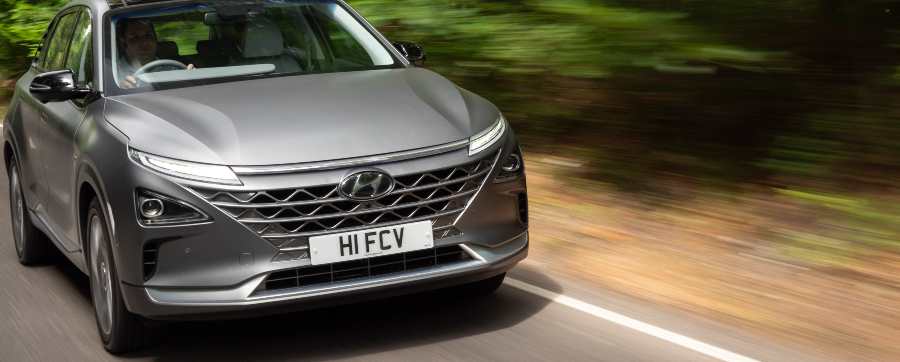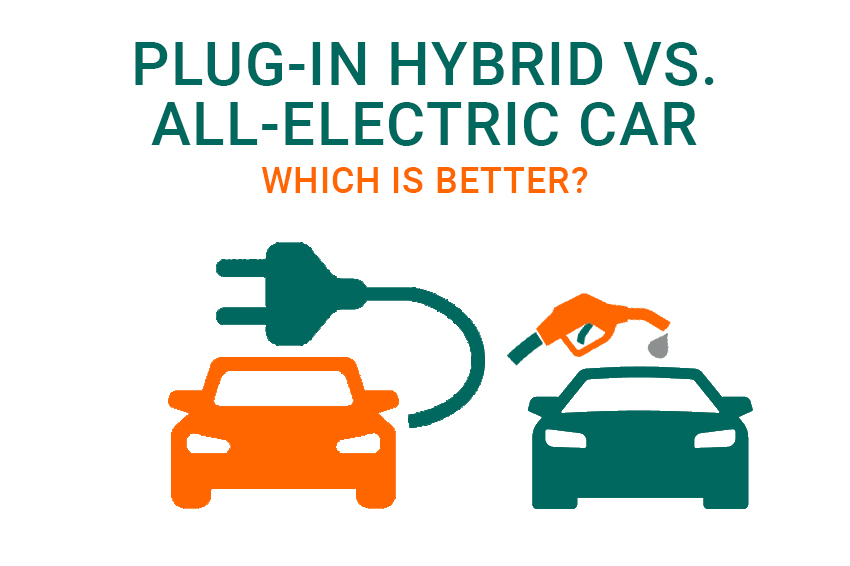Whether you’re someone who’s started to consider electric vehicles, or you’ve been looking at what’s available for a while, there’s no denying that low and zero emission vehicles are growing increasingly popular.
At the moment, both plugin hybrids electric vehicles (often referred to as PHEV) and battery electric vehicles (BEVs) are both classified as ultra-low emission vehicles. According to the Government, the current definition of an Ultra-Low Emission Vehicle (or ULEV) is a vehicle that emits less than 75g/km of CO2.
In this article we’re going to look at the two different types of vehicle and compare them on a variety of things including efficiency, cost and whether they are future proof when it comes to the new laws regarding sale of petrol and diesel vehicles in the UK which will come into play in 2035.
What is a plug-in hybrid?
More manufacturers have introduced plug-in hybrids over the last few years than electric vehicles, however that has started to change. So, what is a plug-in hybrid or PHEV exactly?
A conventional hybrid, such as the Lexus NX, only uses electricity when it’s driven at low speeds. Once it is being driven at a higher speed it switches to fuel and the electric battery is then recharged using components in the vehicle.
If you have a plug-in hybrid, such as the popular Toyota Prius, then it will run on electricity until the battery power drops to a certain level. Once the battery reaches the predetermined level then the plug-in hybrid will switch to fuel. Before you can drive using the battery again you will need to recharge the electric battery using a plug-in point.

It used to be that a plug-in hybrid was seen as an electric vehicle up to a point. However, the fact that many of the larger PHEVs have CO2 emissions of over 75g/km. Towards the end of 2020 a study revealed that some PHEVs output up to 89% more CO2 than advertised by manufacturers.
What is an electric car?
An electric car does exactly what it says on the tin. It’s a car that runs purely on electricity.
At the time of writing there are two types of electric cars available, though one is definitely currently more restrictive when it comes to vehicle choice. The two types are a standard battery electric vehicle (or BEV) and a hydrogen fuel-cell electric car.
The standard BEV runs on a battery that you need to charge before you start driving, while a hydrogen fuel-cell car uses the combination of hydrogen and oxygen to produce electricity which, in turn, fuels the car.
At the moment there are a very limited number of hydrogen fuel-cell vehicles on the market in the UK, in fact, there are two, the Toyota Mirai and the Hyundai Nexo.

As there are very few hydrogen fuel-cell vehicles available, when talking about electric cars we will be focusing on battery electric vehicles (BEV).
The core difference between a plug-in hybrid (PHEV) and a battery electric (BEV) vehicle is that a PHEV cannot rely completely on an electric battery, running on fuel when the battery reaches a certain point, it also has a much lower battery range than the BEV.
Plug-in hybrid vs. electric car: Which is more efficient?
Firstly, let’s look at efficiency.
Because they run on both fuel and electricity it’s obvious that the plug-in hybrid is going to be considered more efficient than the fully electric vehicle. Fully-electric vehicles can only go so far before they require a charge to continue on the journey.
That’s not to say that a plug-in hybrid is without its downsides. As well as charging your vehicle to get some electric mileage from the battery, you also need to pay for fuel. This means that a plug-in hybrid can cost you more to run. With the additional weight of an electric battery you will find that fuel doesn’t go as far as it would in a traditional petrol or diesel vehicle.
At the end of 2020, after a couple of years during which the range of newer electric vehicles rose by a considerable amount, the average distance an electric vehicle can travel before it requires recharging is now around 181 miles. Unlike a traditional diesel or petrol vehicle, if you’re on a longer journey you’ll need to find a garage with electric charging points.
Luckily, if you’re on your way home when it starts to look as though the battery is getting low, you can charge both a plug-in hybrid or electric vehicle at home for as little as 2p per mile, depending on your tariff.
Ultimately, both plug-in hybrids and fully-electric vehicles are efficient. After all, they can travel very far for very little.
If you’re looking to drive longer distances in your car then it is likely you would consider the plug-in hybrid to be more efficient. Luckily, more 100% electric vehicles are being produced with higher mileage and also, thanks to the realisation that our infrastructure needs to improve in order to support the turn to electric vehicles, more charging stations are being set up in areas where previously provision was incredibly poor.

Plug-in hybrid vs. electric: which is best for the environment?
The answer to this question is pretty obvious, but it’s one that we should still discuss.
Though a plug-in hybrid car can be seen to have some benefits to the environment, in that its emissions are lower than a standard petrol or diesel vehicle, ultimately, an electric car is much better for the environment when it comes to CO2 emissions. An electric car emits no CO2, while a plug-in hybrid (depending on the vehicle’s weight and engine size) can emit up to 75g/km. So, while plug-in hybrid emissions are lower than an ICE (internal combustion engine) car, they still produce some CO2 which is released into the environment.
Of course, the argument could be made that the emissions produced when manufacturing the battery for an electric car are just as harmful to the environment. In fact, production of your BEV, specifically the lithium-ion battery, is where the majority of the emissions will come from. Research has been done that shows once your car is on the road, your carbon footprint will not continue to increase in a significant way. Depending on how your electricity is produced, your carbon footprint over the life of your electric vehicle will be around 42-50 tonnes of CO2. If you’re driving a petrol or diesel car then your carbon footprint will be around 58 tonnes of CO2.
Plug-in hybrid vs. electric: Which is cheaper?
Something that is often mentioned when it comes to the subject of plug-in hybrids and pure-electric vehicles is the cost. Though electric vehicles aren’t the newest technology, manufacturers produce fewer of them than they do the equivalent petrol and diesel cars. When more factories have switched to the production of electric vehicles (some have started to do this), more vehicles will be available and the price of production will also decrease.
Of course, when you do invest in an electric vehicle there are other savings that can be made. These include vehicle excise duty (road/car tax), company car tax and congestion charges. If you’re driving a 100% electric vehicle then you’ll be exempt from paying vehicle excise duty, you’ll also benefit from much lower company car tax (if you’re leasing or purchasing a vehicle for your business) and will avoid any charges levied for vehicles in low or ultra-low emission zones.
When it comes to plug-in hybrid vs. electric cars there isn’t a clear winner in the economy stakes until you start to consider running costs, maintenance and vehicle excise duty. Though both have a high initial cost, ultimately, the lower running costs of the pure-electric vehicle makes it far more economical to run.

Who is a plug-in hybrid suited for?
If you’re someone who likes to travel long distances on a regular basis then it is likely you’ll be considering a plug-in hybrid as you can switch to fuel when your battery starts to run low. Of course, most have a very low full-electric range (in most cases no more than 50 miles) but the range of a fuel tank is much higher.
A hybrid vehicle is seen, by many in the motor industry, as a stepping stone to purchasing an electric car as switching can be quite daunting. A hybrid has some of the benefits of an electric vehicle without the issue of range anxiety that many feel when thinking about getting a fully-electric car.
Who is an electric car suited for?
If you’re looking for your next vehicle and you know that distance isn’t something you’re concerned about then there’s no reason why you shouldn’t choose a fully-electric car.
Whether you’re looking to go electric because you’re thinking about the environment, or you simply love the look of the brand new Porsche Taycan then an electric car is for you.
Gone are the days when there were only a few fully-electric vehicles available, now you can choose everything from a sleek sports car to a practical, easy-to-park hatchback. Though price could be a concern, it is possible to get your perfect electric vehicle on a lease agreement to make it a more budget-friendly option.
And of course, electric vehicles are also great if you want to reduce your running costs.
Plug-in hybrid vs electric: The future
If you didn’t know by now, the UK Government has committed to making the country carbon neutral by 2050. This is going to take a lot more than just eliminating petrol and diesel vehicles from the roads, but that is a start.
From 2035, petrol and diesel cars will no longer be marketed or sold as new in the country. This means that not only will vehicles that are solely powered by petrol and diesel be disappearing from dealerships and vehicle websites, but we will also be witnessing the end of plug-in and conventional hybrids.
Ultimately, the future is being steered very clearly in the direction of fully-electric vehicles and with the country’s infrastructure set to be modernised to support this change, we will soon see more electric cars on our roads.


You need to include in this paper that electric cars are far more expensive to insure compared to petrol or diesel if you are going to give a balanced view.
Hello Simon, thank you for your feedback. We will pass this on to the team.